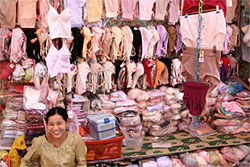The cloud of China hangs heavily over Burma.
No matter where I went on a recent visit to Burma, the Chinese shadow was apparent, from the steady stream of trucks headed for China, to shelves full of made-in-China goods, to Chinese-owned businesses, to the Chinese oil technician I met in Sittwe.
Most Burmese I talked with are angry about what they consider China’s domination of Burma and resentful of local Chinese who pervade the business community.
“We’ve become a province of China,’ a Burmese friend said. ‘They’re doing whatever they want here.’
The Burmese junta and Chinese government have had close ties since 1988 and share a no-nonsense approach to internal dissent. They used similar tactics recently to, as they put it, ‘crush’ monk-led protests in Burma and Tibet.
Old Burma Road packed with trucks
Not only is China providing the Burmese generals with military hardware and diplomatic support, it is fast on its way to becoming Burma’s leading trade partner.
The old Burma Road, built during World War Two from Rangoon to China, is packed these days with trucks taking Burmese agricultural products to China and bringing back everything from toothpaste to pots and pans to women’s lingerie.
‘We give them what we grow,’ a friend said. ‘They give us junk. You buy that stuff and in two or three months it’s broken.’
The imports from China have replaced western goods shut off from Burma by economic sanctions imposed after the government killed an estimated 3,000 pro-democracy demonstrators in 1990.
To accommodate the increased trade, China is financing improvements on the Burma Road to speed the flow. I saw new bypasses around Mandalay and sections being widened to four lanes.
And to quench it’s ever-increasing appetite for energy, China is developing oil and natural gas fields off Burma’s southwest coast and planning a pipeline all the way across Burma to Yunnan province in southwest China.
Nothing new
A vendor in Bagan displays her inventory of lingerie made in China, early 2008.
RFA/Tyler Chapman
At the airport in Sittwe, near the offshore fields, I struck up a conversation with a Chinese man who said he was a project manager for Petrochina, the Chinese oil company.
He said he had been trained in Houston, Texas, at Input/Output Inc. In fact, he said, Input/Output (now ION Geophysical Corp.) is helping Petrochina survey Burma’s offshore sites.
China’s exploitation of Burma’s natural resources is nothing new.
Satellite photos of Burmese forests on the China border show miles of clear-cut devastation where lush teak groves once grew. Millions of dollars worth of logs went to China, where environmentalists say they were labeled Indonesian teak to circumvent embargoes on the Burmese variety.
Smugglers thrive and corruption is rampant
‘It’s amazing what has happened up there,’ an environmentalist told me. ‘Those forests will never come back.’
Burma-China border towns have become free-trade zones where residents say smugglers thrive and corruption is rampant. Drugs, gems and other contraband cross the border either way, for a price.
Nowhere is the animosity toward the Chinese more evident than in Mandalay, where descendants of World War Two Chinese refugees and newly arrived immigrants dominate the business community.
Broad segments of the Burmese economy
I visited one of the three new malls built with Chinese money in Mandalay. Security guards at the door made it perfectly clear: no pictures inside. The upscale clothing and electronics shops were doing little business, their prices out of reach for ordinary Burmese.
Even though ethnic Chinese make up but three per cent of the population, they are said to control broad segments of the Burmese economy, with the connivance of the generals at the top.
‘They have the best cars, the best houses,’ a Burmese acquaintance told me. ‘They’ve sold out to the government and become rich. That’s all they want, to be rich.’
Even though China has paid lip service to the need for change in Burma, there is little incentive for Beijing to support a move toward democracy. It has too much to lose. A democratic government in Burma would welcome a renewal of western trade and investment.
‘Both governments want to keep things just as they are,’ a friend told me.
Tyler Chapman is a pseudonym to protect the author's sources.





